A lot has been written recently about how company cultures are turning toxic. First, there was the piece by McKinsey late last year which highlighted the problem, declaring a fundamental shift in the employee / company relationship. The article was noteworthy because it used such expressions as ’employees are grieving’ while stating that ’employers are overlooking the relational elements’ of work alongside the remarkable statement that ’employers can’t fix what they can’t understand’, suggesting that companies lack a fundamental understanding of basic human motivation.
The article paints a dire picture of senior leadership teams across companies: of being completely disconnected from their employees, assuming employees to value things they do not, and oblivious to what makes for a vibrant culture. This has been reflected in Engagement Surveys I have seen across companies for the last few quarters if not more, with senior leadership typically being marked down as employees vent their frustrations.
This disconnect between senior leadership and employees can be seen in McKinsey’s graphic below:
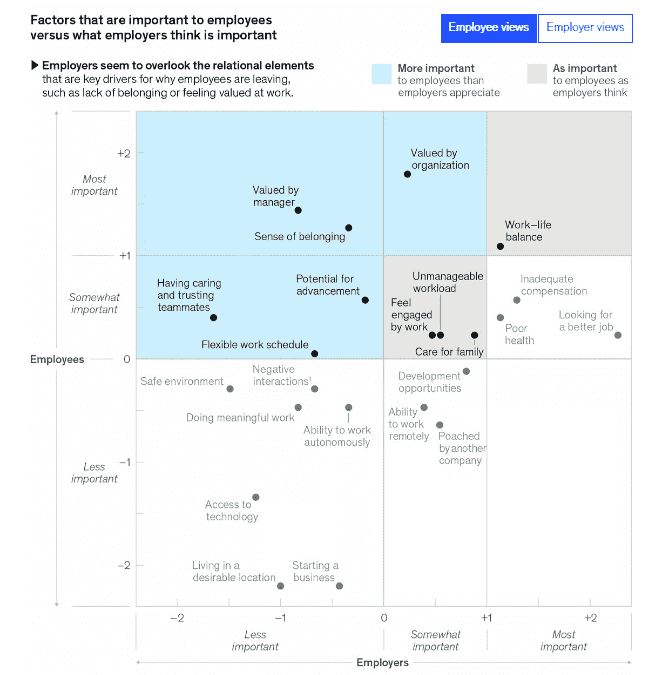
Then came the MIT Sloan study which received a lot of bandwidth and found that a toxic company culture was by far the #1 factor behind ‘The Great Resignation’, using a neat analysis of Glassdoor data. It was found that the culture was valued 10x more important than salary, something that should lead to a re-evaluation of companies’ people strategies and (as I shall come on to argue) systems:
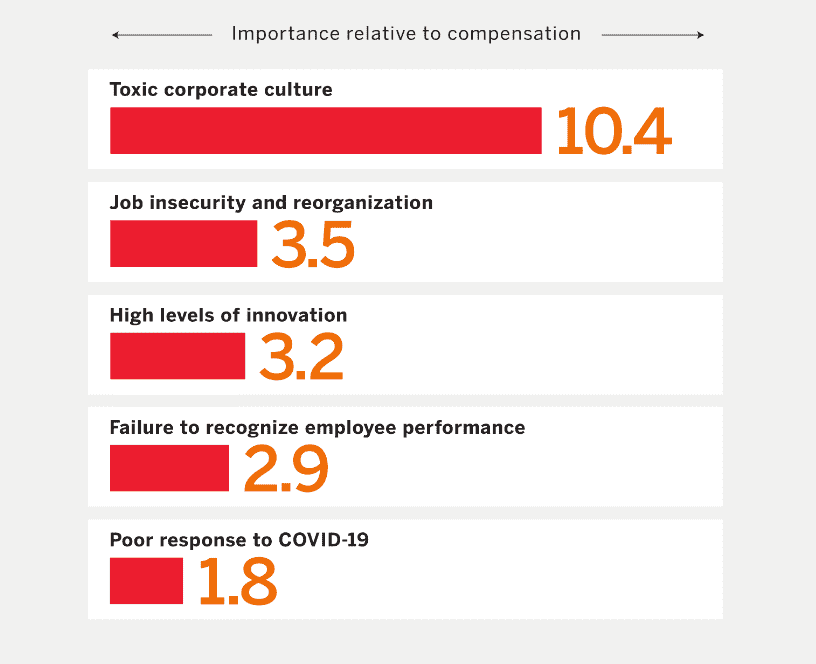
In a follow-up to this study, a lack of respect was cited as the main factor underlying this toxicity.
In the face of this, many in senior management have felt compelled to respond with either a ‘cultural reboot’ or ‘bread and circuses’ style popularity sprees in an attempt to placate the masses. Something must be done! seems to be the clarion call behind this approach.
What’s at Root? (Understanding Humans)
As I’ve been saying for some time now, the disconnect runs far deeper than a simple us-and-them dichotomy between senior leadership/HR and the employees at large. Instead, we should look to the appalling misunderstanding of what makes humans tick in every aspect of how companies are being run – from the concepts they subscribe to in psychology (most of which have been debunked by dozens of meta-analyses and experiments) to the so-called ‘leadership development practices’ or ‘people strategies’ they put in place, to the people systems they use, most of these actually doing more harm than good and fuelling the very toxic behaviours companies are trying to eliminate.
The problem at root is that almost all companies use a model of human motivation that is individualistic rather than social which actually prevents the formation of human, authentic bonds which are critical to collaboration and a healthy culture, as a beautiful year-long study into network dynamics among Microsoft employees has revealed. Put simply, the less ‘wired in’ we are with others, the more collaboration suffers, and the more siloisation, exclusion and poor work relationships take root, leading to ‘ingroupers’ and ‘outgroupers’ across the board:
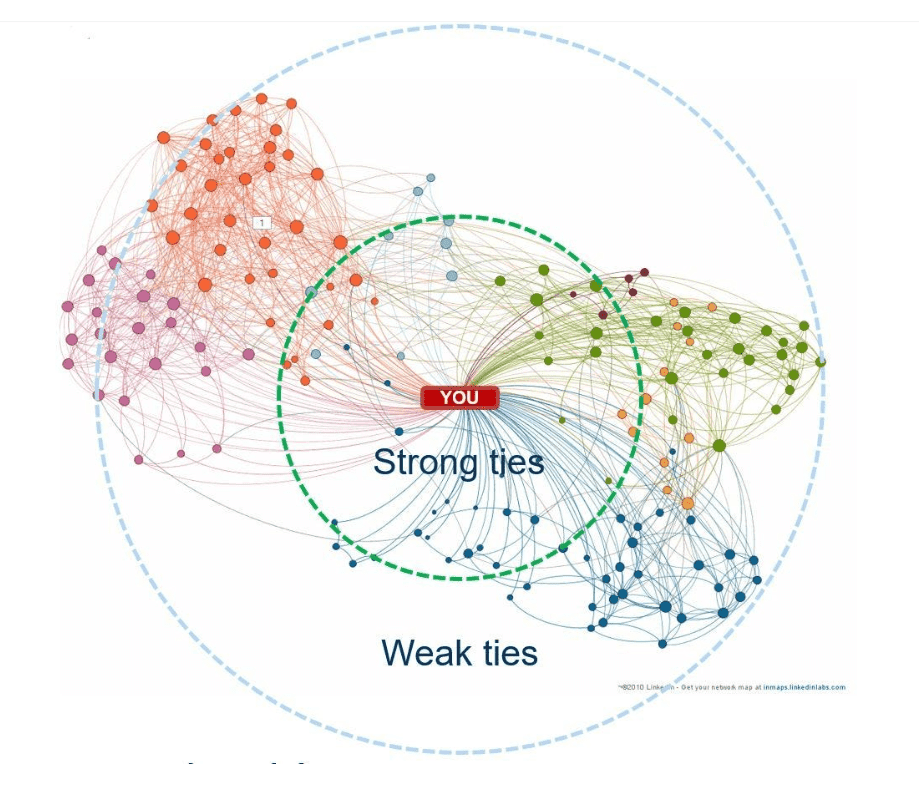
Where social ties are weak rather than strong, dissatisfaction and attrition risks increase, leading to an organisation that becomes increasingly difficult to ‘drive’ in the direction senior leaders want to go (you can see that most of the ties in the graphic above are weak). In this kind of culture, the one thing left to man is the exit doors. Typical of these kinds of organisations are cliques with an increasing dependence on ‘superstars’ to deliver on strategy. This is a direct consequence of the individualistic approach nearly every company takes.
Yet it is social factors, and not individual factors, that are central to workplace performance. This is mirrored in employees’ own attitudes, where social factors consistently outrank more individual factors (like pay) in their evaluation of engagement at work, as another large-scale study among Tech Companies has corroborated. The ‘Best places to work’ in this neat data crunch, analysed using IBM Watson, are those with high ‘social value’.
Have Companies Got Human Motivation All Wrong?
It’s very difficult to try to explain to a person who is so inured to doing things a certain way that they might not be just slightly mistaken in their approach, but completely mistaken, and, moreover, doing more harm than good when every waking hour they believe in their heart of hearts they are doing great work. Galileo had this problem when no matter what he did, he was unable to convince cohorts of scientists simply to look through his telescope to see that the planets actually orbited the sun, and the Earth was not at the centre of our planetary system, as almost everyone believed.
Today we are at a similar point. So many groups – from HR to Consultants to eminent professors in popular psychology – subscribe to a psychological belief system that the individual is at the centre, when overwhelming research into their models have shown their claims to be overblown if not outright bunkum and mostly harmful.
This is where organisations need to pay much more attention to evidence instead of just doing what they did last year and the year before that, or blindly copying what other companies do, following what is little more than dogma.
For example, on a development level, you may recall that companies have for decades trained people using Abraham Maslow’s ‘Pyramid of Needs’, and many still do. But it’s hokum. That’s not me saying it, but Maslow himself, who, shortly before he died declared that ‘any behaviour tends to be determined by several or all of the basic needs simultaneously rather than by only one of them’ in one sentence making his pyramid into more of an, erm, omelette.
More recently, Carol Dweck’s Mindset has replaced Maslow as organisations’ go-to for self-development, and for a neat summary of why this is also moonshine there is none better than Marc Effron’s take on it here. Angela Duckworth’s Grit has also featured prominently in HR Communication and Development plans. Grit, also, has been cut to pieces by the experimental scalpel, with one respected geneticist (Robert Plomin) calling it ‘complete bullshit’. Yet because it’s a buzzword and bandwagon, companies use it as a tool to explain so-called human motivation and behaviour – and never mind the evidence.
There is zero evidence that any of these concepts can help companies get their people in the right place, and we can see that powerful social effects (toxicity) are more causative of burnout and intentions to quit than individualistic mind-management can overcome, per the McKinsey graphic below:
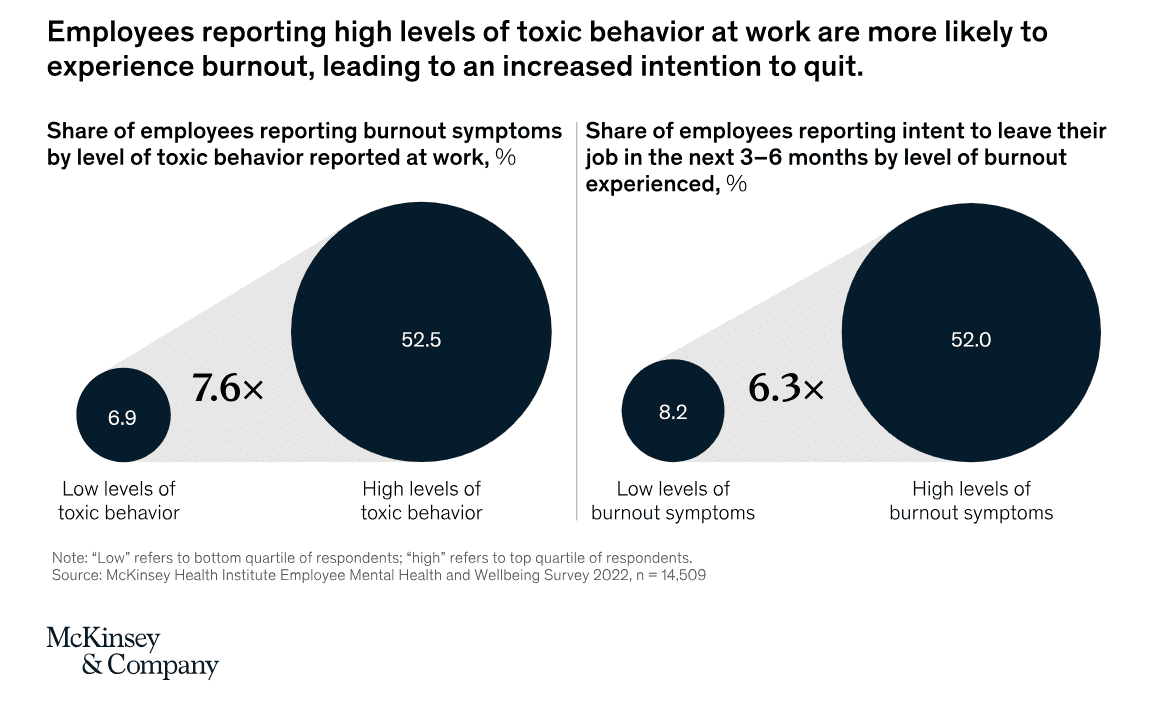
It’s not about Mindset, but other people (above)
What do all these forms of psychology have in common? i) they all present a version of us as being fundamentally individualistic; ii) scads of experimental studies into them have demonstrated the concepts to have little effect, if any at all, and iii) they ignore other effects (like traits, emotions and what’s going on in the social environment) which are as much as 80x more powerful than these faint and feeble toothpicks of psychology companies seem to like to subscribe to.
What We Know from Schools
Anyone who has followed studies into factors of success in schools (where wide-scale data analysis is ironically much more rigorous than it is in companies) will know that social factors whup individualistic factors by a long way and every time.
The extensive Hattie meta-analyses into the determinants of the success of schools, for example, have found the most critical factor is how well teachers work with each other (or what is known as ‘collective teacher efficacy’). That’s a social, and not an individualistic thing.
The same is found for schoolchildren. Do we think that individualistic factors (such as IQ or effort) are the most significant predictors of success?
They’re important for sure, but not as important as how well your peers do. Again – a social and not individualistic factor. Also remember that school work features much less collaboration than that required in companies.
So this research overwhelmingly tells us (if we did not know) that we are fundamentally social and not individualistic, beings – and that both our satisfaction doing tasks and performance stems from our relationship with others. Maslow’s Hierarchy got it wrong – it’s not self-preservation that is most fundamental to human existence – but social engagement.
A Broken System Which Will Break Your Culture
But this is not what is practised or believed within organisations, especially via their systems (systems make a mighty difference to cultures – stay tuned for a future post).
HR is a major culprit in this regard. It persists with antiquated practices like Performance Management which defines performance through a highly individualistic lens, where individuals in a team compete against each other as if they’re in an exam (Performance Management believe it or not has actually been lifted straight from exam halls, over 120 years ago). People are rated based on averages and not absolutes, against each other and with little or no attention being paid to social engagement, which as we have seen is what actually drives performance.
No surprise then that studies have consistently found zero correlation between PM scores and actual business outcomes. Have a look:
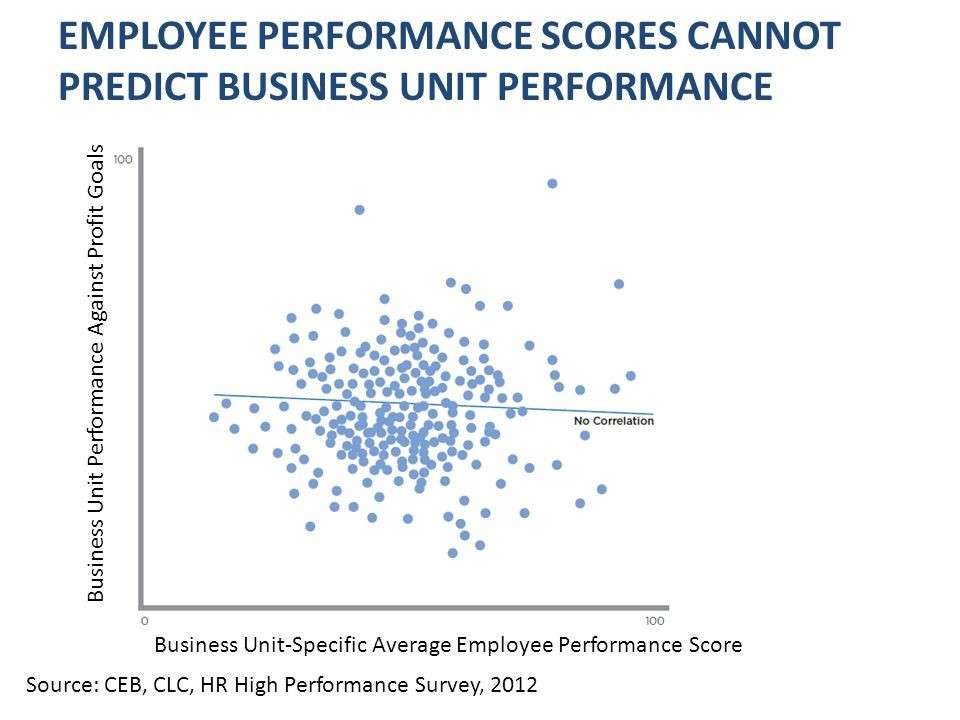
This narrow individualism and misunderstanding of how we really are though doesn’t just stop at being a glorious waste of time.
In his systematic review of Performance Management as a system, Kevin Murphy found PM to be antagonistic and actually predictive of the onset of toxic workplace relationships.
Meanwhile, in her meta-analysis which every HR practitioner should really read, the guru of Performance Management Elaine Pulakos found that PM does ‘more harm than good’ and that ‘Performance Management processes…
‘disengage employees, cost millions, and have no impact on performance’.
Disengage employees. Cost millions. No impact on performance. Is this really what we are going to hang our hat on when ‘developing’ our people and with them our organisational culture?
Back to the Great Disconnect Between Employees and Companies
An overwhelming majority of employees and managers have for a long time been critical of Performance Management, believing it doesn’t work. Yet while some companies (like Adobe) have abandoned the practice, Performance Management is still going strong in over 90% of companies.
Performance Management is not the only system companies use that actually serves to increase organisational toxicity. In his review of Talent Management systems (think the ‘9 Box’), Paul Sparrow found that a key failure of Talent Management is that it is elitist rather than egalitarian, and is mostly a poisoned chalice for any poor soul who does stand to gain from a promotion. It just ends up creating an elite of so-called superstars with opportunities unevenly distributed, and a layer cake which ends up with everyone struggling to get the cherry.
Let me ask you, which kind of culture do you think is likely to be more vibrant and less toxic – an egalitarian or an elitist one? Which would you rather have? Bye bye 9 Box.
The root problem again is the very flawed understanding of the human as individualistic rather than social and this error then amplified in the systems and type of development organisations use, in turn generating the kind of toxicity organisations presumably would like to avoid.
From Toxic to Terrific – What You Can Do To Turn Around Your Culture
Turning around your culture from Toxic to Terrific is actually not so difficult – but first these dragnets holding your company back must be cut loose once and for all.
In the next post, I will share how Getting to Terrific can be done with a system tool most companies are already using, plus the steps you need to take to make it happen.
The article was first published here.
Connect with Nick Henley on LinkedIn.
Photo by Dominik Martin on Unsplash.

 5.0
5.0 


















